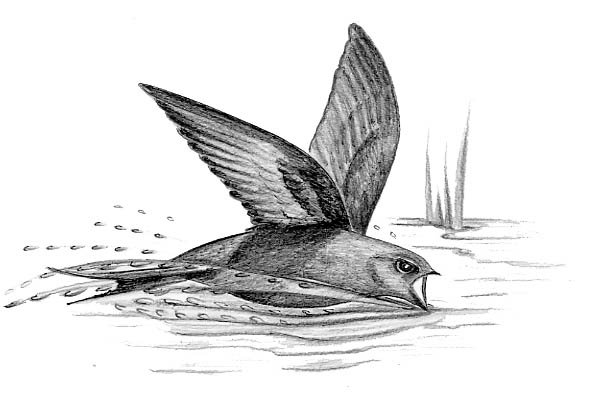
Dear Bird Folks,
A zoologist friend of mine told me that there is a bird, about the size of a pigeon, that never lands. The bird is described by David Lack in his book, Enjoying Ornithology. Please enlighten me on this wonderful creature.
– Dr. Hafeez, Lahore, Pakistan
Hello, Dr. Hafeez,
Usually the first few lines of my columns have a wisecrack or two, just to set the mood. Some people could read about birds all day, but the occasional reader might find endless bird talk to be kind of dull, so I usually try to lighten things up a bit. However, this column is going to be slightly different. You may be the first Dr. to have ever written to us, and you are definitely the first person of any kind to have written from Lahore, Pakistan. Oh sure, we get tons of letters from Faisalabad and Rawalpindi, Pakistan, but Lahore, not so much. So I don’t want to mess things up by being too much of a wise guy, but we’ll see how it goes.
I hate to argue with your zoologist friend or anyone who has “gist” at the end of his or her title. As soon as I see that, I know that person has extra smarts. But in this case the extra smarts doesn’t cover birds. Oh sure, birds like to fly, and if they had their way perhaps some of them would never land. But until birds can somehow get their eggs to fly too, they’ll have to come down to earth if they want to reproduce and raise a family. And believe me, there is nothing that brings you down to earth more than raising a family.
In order to maintain their flying ability, birds must remain as light as possible. Being fat and pregnant may work for mammals, but it won’t cut it in the bird world. By laying eggs the mother bird’s babies develop outside of her body, enabling her to keep her girlish figure and her ability to fly. Some people may ask: What about bats? They don’t lay eggs, yet female bats can fly while pregnant. To this question I would answer: I only write about birds. I can’t help you with the bats. Let’s move on.
If all birds have to land, what could David Lack have been talking about? And more importantly, who is David Lack? I’m sure most Americans have never heard of him. We tend to focus on what goes on in our country while not paying a whole lot of attention to important people in the rest of the world. For example: How many of us can name the Prime Minister of our best friend, Canada? See what I mean?
David Lack was a noted British ornithologist. That’s right, ornitholo-gist, so right away you know he was smart. Lack, who past away in 1973, was the author of numerous books and made detailed studies of several bird species. One of the species Lack wrote about was the Common Swift. The Common Swift is a bird that breeds in Europe, flies at speeds in excess of one hundred miles an hour and is a master of flight. The swift may also be the bird your friend thought never landed.
In North America people put out nest boxes to attract bluebirds, swallows and martins: in Europe the swift is one of the birds people like to attract. Not only do they enjoy the bird’s company, but a single swift will scoop up several thousand insects each day during the nesting season. Simply by inviting the swifts to nest in their yards the Europeans save thousands of Euros on sprays, fly swatters and those stupid bug zappers. But it is not the swifts’ diet that makes this bird special. Check this out.
After a few weeks of being fed piles of gooey bugs by its parents, a newly hatched swift will suddenly drop from the nest, open its wings, become airborne and will not land again for the next three years. Yes, you read that right. Once a young swift leaves the nest it will continue to fly, nonstop, for three years. Common Swifts eat, drink, bathe, sleep (really) and, yes, mate entirely on the wing. In fact, these birds were members of the Mile High Club centuries before Richard Branson made it fashionable.
Then, like most good things, it all comes to an end. After three years of flying free the young swifts reach maturity and the party’s over. The birds return to the breeding grounds, find a mate, build a nest and lay the eggs, which requires them to land, just like all the other birds. I don’t want to speak for your zoologist friend, but it’s possible that he or she either misread or, like our own Roger Clemens, misremembered what was written in Lack’s book. But whatever, you can be sure that all birds must land at some point in their lives if they want to breed and continue their species.
Thanks for the note, Dr. Hafeez. By the way, I’m sure you already know this, but for everyone else, the Prime Minister of Canada is Stephen Harper, who, as far as I know, is not a member of the Mile High Club.